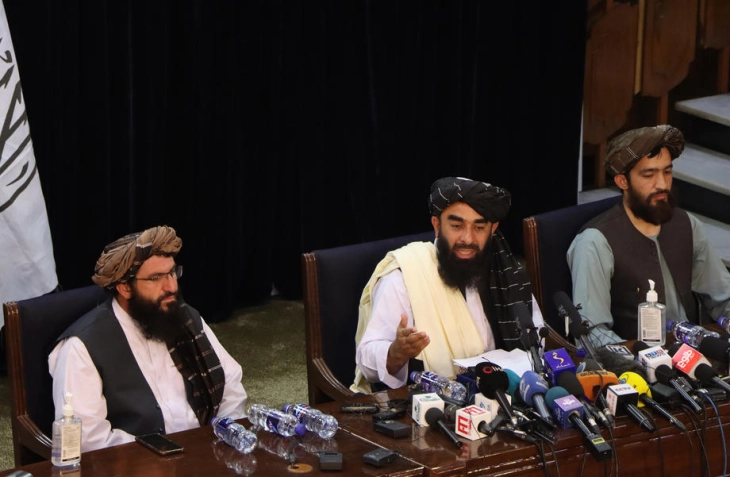Taliban promises sceptical Afghans amnesty for all, rights for women

Kabul, 18 August 2021 (dpa/MIA) - The Taliban struck a conciliatory tone on Tuesday during the first press conference held by the radical militant Islamists following their takeover of Afghanistan.
Taliban spokesperson Zabihullah Mujahid said the Taliban is not hostile to anyone, promising Afghans a general amnesty that would also apply to those who had fought against the group in the past.
"When the government is formed, then everyone will have a part in it," Mujahid said, adding that the Taliban were not simply interested in power, but were seeking to build an Islamic government.
The amnesty likewise applies to those who worked supporting foreign forces in the country, Mujahid said.
When asked about innocent civilians who had been killed in the battle for the country, Mujahid said their deaths were unintentional, going on to blame the chaos in Kabul of recent days on the incompetence of the former government.
Afghan women have feared the return of the Taliban, believing they will roll back 20 years of hard-fought gains. But Mujahid said the Taliban will advocate for women's rights - so long as fit within the framework of Sharia law.
He added that women would be able to work in the fields of health, education and other areas.
He also had reassuring words for the media, saying outlets should remain impartial, but that any content should not run counter to Islamic values.
The Taliban brutally ruled Afghanistan for about five years at the end of the 20th century, imposing their ultraconservative Islamic views. US-backed forces ousted them in the wake of the September 11, 2001 attacks.
Many who experienced that time are unwilling to take their chances and have desperately sought to escape the country.
During their previous rule, the Taliban enforced a strictly Islamist society, which meant most women were banned from public life and men could be punished for not displaying enough piety. Public executions and amputations were carried out. Perceived vices, such as alcohol and Western music, were banned.
As the Taliban tried to win over sceptics with a surprisingly mild tone on Tuesday, calls came from world leaders for the Taliban to allow those wishing to leave Afghanistan to do so in safety as well as warning them to respect human rights in general.
"The Taliban must respect and facilitate the safe departure of all those who wish to leave," NATO Secretary General Jens Stoltenberg told reporters in Brussels.
The White House confirmed Tuesday that some 4,000 US soldiers will soon be at Kabul airport after scenes of chaos and panic there on Sunday and Monday. That number is set to rise to 6,000 in the coming days.
Takeoffs and landings were possible again on Tuesday at both the military and civilian sections.
The US forces are facilitating evacuations of US nationals and former Afghan aides to the troops.
The troop presence is also needed for the slew of other nations working to evacuate their citizens and local Afghan staff.
However, governments such as Germany expressed concern that the Taliban were only allowing foreign nationals to reach the airport, raising questions about how Afghans would be able to get out.
In Washington, the Pentagon acknowledged that its troops were having to coordinate with members of the Taliban stationed outside the airport to facilitate the evacuations.
Around 500 to 600 Afghan soldiers were also at the airport to support the US forces, Pentagon spokesman John Kirby said.
Currently about one plane can land and take off per hour, the Pentagon said, adding the safety of the airport was guaranteed.
As the US military and other foreign governments continued their evacuation measures, the Taliban's co-founder and one its most senior officials, Mullah Abdul Ghani Baradar, arrived back in Afghanistan on Tuesday.
A delegation led by Baradar, who is deputy head of the Taliban and is in charge of the Taliban's political office in Doha, landed at Kandahar airport in southern Afghanistan on Tuesday afternoon, a Taliban spokesman announced on Twitter.
Baradar is the highest-ranking representative of the Islamists known to have arrived in Afghanistan so far, and is tipped by intelligence sources to be given a post similar to that of prime minister on the eventual formation of the Taliban government.
In February 2020, he signed the agreement with the US on behalf of the Islamist militant organization to end the US-led military mission in Afghanistan.
Taliban leader Hibatullah Akhundzada has not been seen in Afghanistan since the Taliban takeover and his whereabouts is unknown.
The leaders of the G7 countries will hold a video conference to discuss the situation in Afghanistan, according to the US and Britain.
Biden and British Prime Minister Boris Johnson spoke on the phone on Tuesday and agreed to hold the virtual meeting next week "to discuss a common strategy and approach," the White House said in a statement.
Johnson's office released its own statement confirming both leaders looked forward to a G7 meeting in the coming days, the PA news agency reported.
The European Union's foreign affairs chief Josep Borrell meanwhile said the 27-member bloc must speak to the Taliban because they had "won the war." He said doing so was essential to preventing a humanitarian crisis.
"We will deal with Afghan authorities such as they are, at the same time remaining naturally vigilant," Borrell said following a meeting of EU foreign ministers. This was not the same as official diplomatic recognition, he stressed.







